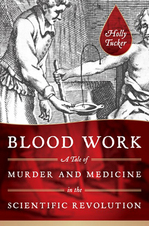The Early History of Blood Transfusions
By Julie Ruel, Social Media Manager, Stanford Blood Center
Medicine and murder were two words I did not expect to see together in the title of an NPR talk on the history of blood transfusions. Holly Tucker, a professor at Vanderbilt University in Nashville, was going about her usual business as she researched information for a class lecture on the discovery of blood circulation by an English physician in the 1620s. What she uncovered, purely by accident, led to her book about the history of blood transfusions, “Blood Work: A Tale of Medicine and Murder in the Scientific Revolution“.
The first blood transfusions on record took place in France during the 17th century. Controversy unfolded when Jean-Baptiste Denis, a French physician who was not well respected in his profession, was desperate to make a name for himself. In light of the recent revolutionary discovery of blood circulation, the British felt there was more to be experimented with. They wondered, “What would happen if we transfused animal blood into humans?” After all, animals were seen as being more pure than humans. They didn’t cause trouble. They were peaceful as they stood around grazing in the fields. The British were close to performing the first experiment when Denis jumped in and stole their idea, along with all the credit for it. They were none-too-pleased with the egotistical physician.
He certainly wasn’t impressing his own people, either. Many of the noble French were traditional Catholics, unwilling to accept the idea of animal-to-human blood transfusions.
Despite the opposition, the physician was determined to draw attention to himself and carry out the controversial procedure. A young boy in town suffering from fevers was a good candidate for experiment #1. To treat the fevers, it seemed logical to use blood from the cool, calm sheep. Denis performed the procedure and lo and behold, the boy survived! (It’s unclear whether the boy’s fevers were actually cured. But based on what we know of medicine today, that would have been purely coincidental.)
Experiment #2, transfusing sheep’s blood into a man simply for experimental purposes, was also a success (meaning, the patient survived).
The subject of experiment #3 was a mental patient who often wandered the streets of Paris yelling at folks at random. Blood from the peaceful cow would surely help this man. Sadly, it didn’t. After the transfusion, the man died. Held accountable for the death, Denis was charged with murder. The ordeal resulted in the ban of human blood transfusions in France unless approved by the Paris Faculty of Medicine. Denis was ultimately cleared of the charges, but soon after ceased to practice medicine.
In closing, here’s a look at some early beliefs and practices around blood that are hard to imagine by today’s standards:
Before discovering that blood circulates, it was believed that it burned up in the heart, as one of the four humours.
The French believed blood transfusions could cause a change in species.
Goose quills were used to puncture the veins during early transfusions.
Mental illness was thought to be the result of overheated blood causing vapors that affected the brain.
Needless to say, we’ve made leaps and bounds in transfusion medicine since then!

